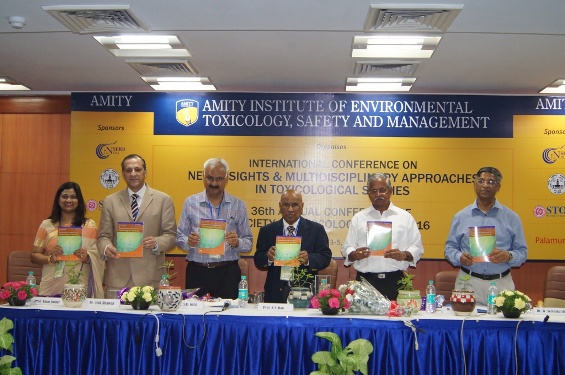03 Aug 2016|Noida | F1 Seminar Hall
Institutions lack funds to deal with challenges in Toxicology, avers experts during New Insights & Multidisciplinary Approaches In Toxicological Studies Conference at Amity

Amity Institute of Environmental Toxicology, Safety and Management (AIETSM) started three day International Conference on ‘New Insights & Multidisciplinary Approaches In Toxicological Studies’ at Amity University Uttar Pradesh, Sec.125 Noida Campus.
The International Conference is a part of 36th Annual Conference of Society of Toxicology (India) 2016 which will see a congregation of the Toxicologists, Pharmacologists, Pathologists, Environmental and Occupational-health Scientists from academia, Industry, Government organizations and Regulatory Agencies across globe. Annual meetings of Society provide a suitable platform to all professionals for interaction and exchange of scientific developments and identify emerging and frontier areas of toxicology research in India and in global prospective.
The Inaugural session of three day International Conference witnessed the presence of eminent personalities including Dr. Alok Dhawan, Director, Indian Institute of Toxicology Research, Lucknow; Dr. K.Krishna Reddy,Chairman-Palumur-Bioscience; Prof. Satish K. Garg, President-STOX; Dr. K.M. Chacko, Director, Shriram Institute For Industrial Research, Delhi; Prof. K.S.Rao. President, ATOX; Dr. W. Selvamurthy, President - Amity Science, Technology& Innovation Foundation (ASTIF) and Prof. (Dr.) Tanu Jindal, Director,AIETSM.
Welcoming the guests, Dr. W. Selvamurthy said that Toxicology is a growing science that has established itself as specialized discipline in its own right. Hefurther added that in the era of environmental sustainability, environmental toxicological studies have occupied center stage to provide viable solution. He emphasized that such conferences can prove to be effective in making a difference in the mission of growth and sustainable development. Dr Selvamurthy hoped that during the conference issues pertaining to human, animal and plant diseases due to environmental toxins will be deliberated upon.
Addressing the gathering, Dr. Alok Dhawan said that exposure to pollutants,toxins or chemicals have harmful effects on human and environmental health and growth of chemical industries have generated variety of environmental problems which affect the ecosystem, resulting in researchers and scientists to work hard on the consequences of toxicity. He averred that India needs to develop a programme on “Thinking India” which should focus on problematic areas in India that require utmost attention by conducting meetings, conferences and seminars on the topic to understand the needs of the industry so that research could be defined in accordance to the changes and necessity. He expressed his hope that during the conference deliberations would be on important issues on toxicology and recommendations would be noted for improving research and education in toxicology.
Highlighting on effects of toxicology, Dr. K. Krishna Reddy said that industrial developments have resulted in the increased release of chemicals into the environment, resulting in the degradation of environment thereby causing adverse effects on the health of living beings. He mentioned that Scientists and Government are working together to create new policies, methodologies and studies to minimize the impact of toxicants in population and environment. Dr. Reddy apprised that there are various kinds of rocks which are toxic by character and some contain minerals which have certain kind of deficiency which may cause toxicity. He stressed that geology and toxicity with multi-disciplinary approach can help prevent contamination of soil, underground water etc. hence, both should work together before concluding any research work.
Sharing his views, Prof. Satish K. Garg said that private and public sector should come together and raise funds to do more research in the area and help mankind.
During the session, Dr. Tanu Jindal presented a brief on Amity Institute of Environmental Toxicology, Safety and Management highlighting the achievements,thrust areas and ongoing projects of the institute.
The first technical session was conducted on “GLP in India and CRO - opportunities and problems” chaired by Dr. Ekta Kappor,Scientist E, Good Labratory Practices(GLP), DST and Dr. P.V. Mohanan, Scientist and Head, Toxicology Division, Biomedical Technology Wing, Sree Chitra Tirunal Institute for Medical Sciences and Technology (Govt. of India) followed by session on “Challenges and Opportunity in Toxicology Research and Education” which was chaired by Dr. D.K. Bandyopadhyay and Dr. Alok Dhawan.
During the three day conference various technical session would be conducted wherein eminent speakers will deliberate upon various topics such as Prof. R. K.Singh, Head, Division of Toxicology, CSIR- Central Drug Research Institute,Lucknow on “Recent Advances in Toxicology of New Compounds with Emphasis on RISUGadv”; Gangamma S, Asstt. Prof., Environmental Immunology laboratory,Department of Chemical Engineering, National Institute of Technology Karnataka,Surathkal on “Airborne Biological Particles in Metropolitan Cities in India:Respiratory Deposition and Susceptibility to Bacterial Infection“; Dr.Sunil Aggarwal, Scientist ‘E’ , DST on “Environment and Developmental Issues: Action Research with Scalable Technological Solutions at the Grassroots Level; Dr. R. P. Singh, Distinguished Scientist& Chair Professor for Nanoscience & Nanotechnology, AINT, Amity University on “Regulatory Science Research and Innovation for toxic effects of Nano particles in Health care” and Mohd Salim Reshi, UNESCO-Trace Element Satellite Center, School of Studies in Zoology, Jiwaji University, Gwalior on “Ameliorative Effect against Acetaminophen Induced Hepatic Injury by the Treatment of Gold Nanoparticles in Rats” amongst others.